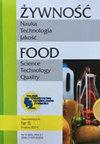发酵纯素食品
Q4 Engineering
引用次数: 0
摘要
近年来,据报道,消费者对均衡饮食和健康预防的意识有所提高。这使得消费者对功能性食品的兴趣增加。主要的功能性食品是含有益生元和益生菌的产品。最常食用的益生菌产品是经典酸奶,但发酵乳制品和非乳制品饮料越来越重要。市场上无奶饮料的数量和种类的增加是由于消费者中乳糖不耐症的增加。此外,在发达国家,转向素食主义的人数逐渐增加。寻找合适的乳制品替代品已成为工业科研和实施项目的重要方向。本文的目的是对可归类为纯素食品的非乳制品益生菌产品的生产和质量的研究和实验结果的参考文献进行综述。饮料形式的新型益生菌食品已经上市或仍处于研究阶段,其原料包括:蔬菜、水果、谷物(燕麦、荞麦、小麦、玉米、藜麦、苋菜)、榛子、椰子、杏仁、腰果以及芝麻和大麻种子。对于技术人员来说,为纯素食者生产食品是一个很大的挑战,因为纯素食者的饮食比素食者更严格,因此使用许多原材料的可能性是有限的。本文章由计算机程序翻译,如有差异,请以英文原文为准。
Fermented vegan foods
In recent years, an increase has been reported in consumer awareness of balanced diet and health prevention. This caused the consumer interest in functional foods to increase. The major functional foods are products that contain prebiotics and probiotics. The most often eaten probiotic product is classic yogurt, however the fermented dairy and non-dairy drinks tend to be more and more important. The increase in number and types of milk-free drinks on the market is due to increasing lactose intolerance among consumers. Additionally, in the developed countries gradually rises the number of people who are switching to veganism. The search for suitable substitutes for dairy milk and dairy products has become an important direction of scientific research and implementation projects in industry. The objective of the paper is to review the reference literature presenting results of research studies and experiments on the production and qualities of non-dairy probiotic products, that could be classified into vegan foods. New probiotic food in the form of drinks, which are already on the market or are still in research phase, are made of raw materials such as: vegetables, fruits, grains (oats, buckwheat, spelt wheat, corn, quinoa, amaranth), hazelnuts, coconuts, almonds, cashew nuts, and also sesame and hemp seeds. It is a big challenge for technologists to manufacture food products for vegans, because the vegan diet is more restrictive than a vegetarian one, therefore possibilities of using many raw materials are limited.
求助全文
通过发布文献求助,成功后即可免费获取论文全文。
去求助
来源期刊

Zywnosc-Nauka, Technologia, Jakosc
FOOD SCIENCE & TECHNOLOGY-
CiteScore
0.60
自引率
0.00%
发文量
0
审稿时长
6-12 weeks
期刊介绍:
The “Zywność. Nauka. Technologia. Jakosc (Food. Science. Technology. Quality)” journal (referred to as ZNTJ) publishes research and review articles from the domain of food science. Research articles cover 85% of the scientific text of the journal.
The basic language for articles is Polish but articles in English can also be submitted.
Articles submitted to the Editor are accepted for publication based on the positive peer reviews pursuant to the peer reviewing procedure.
The Editor reserves the right to abbreviate text, refine titles and/or the text of the articles accepted for publication.
The Editor does not return unsolicited articles and materials.
 求助内容:
求助内容: 应助结果提醒方式:
应助结果提醒方式:


